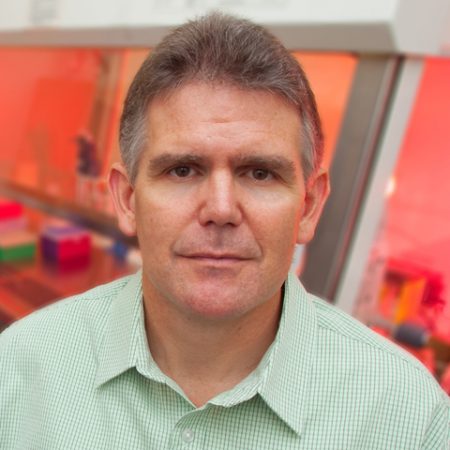
The problem with cancer treatments designed to kill a tumor is that they can kill the patient’s quality of life as well. Now a Florida State University College of Medicine researcher is shifting the focus from eradicating brain tumors to managing them.
Eric Laywell, an associate professor in the Department of Biomedical Sciences, has received a $430,000 grant from the National Institutes of Health to explore a new therapeutic agent and treatment method for brain cancer.
“Managing the tumor like a disease and improving quality of life and relationships during that time is the legitimate end point,” Laywell said. “The focus is not necessarily a cure but making patients’ lives easier.”
The therapeutic agent Laywell and his lab are using is EdU (pronounced E-D-U). It is typically used to label and track cells that divide, but Laywell’s team discovered that over a longer period of time, EdU has a toxic effect: The cells divide more slowly and sometimes die. When they tried it on cancer cells, EdU had the same effect.
“It worked on every kind of cancer cell,” Laywell said. “It will also cross the blood-brain barrier, which can be a limitation for drugs, so we decided to look at brain cancer first.”
The treatment method involves varying doses of the drug based on how the tumor responds. If the tumor continues to grow, the dose is increased. If growth slows, the dose is lowered.
The idea is to manage the tumor so that there are always treatable cells, preventing the emergence of an untreatable, drug-resistant tumor. The hope is that this method will also improve quality of life.
The research focuses on glioblastoma — the most common primary brain tumor (meaning it starts in the brain). The normal aggressive therapy for such tumors includes surgery, radiation and chemotherapy. Even with those therapies the typical prognosis is only a little more than a year, thus the need for new forms of treatment.
“Now we’re just looking at animals that have tumors and seeing if we can reduce their drug burden, increase their life span, and keep them healthier while they’re being treated,” Laywell said. “We’re not using this in humans, but ultimately, that’s the goal.”
Laywell and colleagues are also looking into whether frequency of tumor growth tests and subsequent dosing changes will interfere with that goal.
“If patients can go in once a month and get measured, that’s not so bad, but once a week intrudes into your routine, and it’s expensive,” he said. “The patient doesn’t want to always feel like a patient.”
Frequency is an important factor in the feasibility of management therapy for humans, but Laywell is optimistic that technological advances may help overcome that potential barrier.
Despite the current eradication mentality, he believes brain tumor management will be well received among clinicians and patients in the future.
“When I bring this idea up with people who actually treat cancer patients, they get it,” Laywell said. “If the patient can get past the idea that they have a tumor that’s never going away, but it is being managed, they’ll essentially be healthier, and probably happier, too.”




